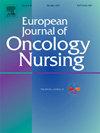Different needs ask for different care: Breast cancer patients’ preferences regarding assessment of care needs and information provision in personalized aftercare
IF 2.7
3区 医学
Q1 NURSING
引用次数: 0
Abstract
Purpose
Aftercare for curatively treated breast cancer patients includes support and information provision. As patients differ in their needs, personalization of aftercare is advocated, but clear guidelines on how to achieve personalization are currently missing. This study investigates patients’ preferences regarding assessment of care needs and information provision.
Method
Semi-structured interviews were conducted with 18 breast cancer patients (15 female, 3 male) who received aftercare for at least three months in five Dutch hospitals. Interviews were analyzed using thematic analysis.
Results
Several patients perceived current aftercare as too intensive or too little, therefore they preferred to discuss their needs beforehand with their health care provider to align aftercare with their needs. Patients preferred more attention to needs on the domains of social and emotional wellbeing and return to work. Patients preferred a comprehensive resource of information on potential (late) effects of cancer and its treatment and of available support options, enabling them to self-manage the dosage and timing of desired information. Patients had positive expectations about an aftercare plan, as it would provide a better overview of their care needs, support options and agreements about the aftercare trajectory.
Conclusions
To facilitate personalization in aftercare, information and care needs should be better addressed and summarized in an aftercare plan. Patients and healthcare practitioners should create the aftercare plan together in shared decision-making. A supporting tool is needed to improve assessment of care needs on multiple domains, to provide layered information and facilitate use of aftercare plans.
不同的需求需要不同的护理:乳腺癌患者对个性化护理需求评估和信息提供的偏好
目的对治愈期乳腺癌患者的术后护理包括支持和信息提供。由于患者的需求各不相同,因此提倡个性化的临终关怀,但目前缺乏关于如何实现个性化的明确指导方针。本研究调查了患者对护理需求评估和信息提供的偏好。方法采用半结构化访谈法,对荷兰5家医院接受术后护理至少3个月的18例乳腺癌患者(女性15例,男性3例)进行访谈。访谈采用专题分析进行分析。结果部分患者认为目前的临终关怀过于密集或太少,因此他们倾向于事先与医疗服务提供者讨论他们的需求,以使临终关怀与他们的需求保持一致。患者更倾向于关注社会和情感健康领域的需求,并重返工作岗位。患者更喜欢关于癌症及其治疗的潜在(晚期)影响和现有支持选择的综合信息资源,使他们能够自我管理所需信息的剂量和时间。患者对善后计划有积极的期望,因为它可以更好地概述他们的护理需求,支持选择和关于善后轨迹的协议。结论临终关怀计划应更好地处理和总结信息和护理需求,以促进临终关怀的个性化。患者和医疗保健从业人员应该共同制定护理计划,共同决策。需要一种辅助工具来改进对多个领域的护理需求的评估,提供分层信息并促进善后计划的使用。
本文章由计算机程序翻译,如有差异,请以英文原文为准。
求助全文
约1分钟内获得全文
求助全文
来源期刊
CiteScore
4.40
自引率
3.60%
发文量
109
审稿时长
57 days
期刊介绍:
The European Journal of Oncology Nursing is an international journal which publishes research of direct relevance to patient care, nurse education, management and policy development. EJON is proud to be the official journal of the European Oncology Nursing Society.
The journal publishes the following types of papers:
• Original research articles
• Review articles

 求助内容:
求助内容: 应助结果提醒方式:
应助结果提醒方式:


